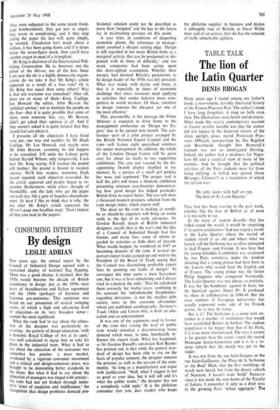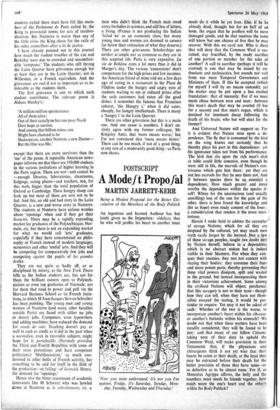The lion of the Latin Quarter
TABLE TALK DENIS BROGAN
Many years ago I found among my father's books a two-volume, lavishly illustrated history of the Franco-Prussian War. The author's name I have long forgotten; it rang no bells even then. The illustrations were lavish and dramatic. What made this nearly contemporary account of l'annee terrible notable was that the author did not rejoice in the deserved victory of the clean, upright, pious, moral. Protestant Prus- sians. Officially non-partisan he, like Bagehot and Burckhardt, thought that Bismarck's triumph was not an unmitigated blessing. Indeed, the author had a weakness for Napo- leon Ill and a sceptical view of many of his enemies. And he thought that the political activities of the Paris students were far from being edifying. A ballad was quoted (from Beranger, Clement?) in a translation of which the refrain was: 'He only sleeps with half an eye, The lion of the Latin Quarter.'
That lion has been roaring in the past week, whether like the lion of Belfort or of MGM it is too early to say.
In the wave of student disorder that has rolled round the world, it would be surprising if 'la nation esiudiantine' had not staged a revolt in the Latin Quarter where the record of student revolt is so old and where what we loosely call the Sorbonne has so often attempted to lead France—and Europe. It was here that the young Giraldus Cambrensis was awakened by two Paris commeres under his window shouting that a young prince had been born in the Louvre who would boot the English out of France. The young prince was the future Philip Augustus who conquered Normandy. The Latin Quarter was not always so patriotic. It was for 'les Goddams' against St Joan; for the Spaniard against Henri IV. It produced its share of collaborators in 1940-44. But the most eminent of European universities has usually expressed some side of the French genius. So it may be today.
But is it? The Sorbonne is a name now ex- tended to a number of institutions that would have astonished Robert de Sorbon. The student population is far bigger than that of his Paris, if it is no more international. The area it covers is far greater than the streets round the sacred Montagne Sainte-Genevieve and it is in a re- mote suburb that the match was put to the tinder.
It was not from the rue Saint-Jacques or the rue Saint-Guillaume, the Place de la Sorbonne or the Boni' Mich, that the first rumblings of revolt were heard, but from the dreary suburb of Nanterre. I haven't even 'bade' Nanterre since it was made the new home of the Faculty of Letters. I remember it only as a drab area in the growing Paris 'urban aggregate.' The students exiled there must have felt like mem- bers of the Parlement de Paris exiled by the King to provincial towns for acts of insubor- dination. But Nanterre is worse than any of the little cities the King chose for the exile of his sulky councillors after a lit de justice. I have already pointed out in this journal how much the student troubles of the LSE and Berkeley were due to crowded and uncomfort- able 'campuses.' The students who still throng the Latin Quarter have grievances enough but at least they are in the Latin Quarter, not in Willesden, or a French equivalent. And the grievances are real if not as important or as in- tolerable as the students think.
The first grievance is one to which each student contributes. The relevant poem is Aldous Huxley's: 'A million million spermatozoa All of them alive: Out of their cataclysm but one poor Noah Dare hope to survive.
And among that billion minus one Might have chanced to be Shakespeare, another Newton, a new Donne— But the One was Me.'
except that there are more survivors than the 'me' of the poem. A reputable American news- paper informs me that there are 150,000 students in the various institutions of higher learning in the Paris region. There are not—and cannot be —enough libraries, laboratories, classrooms, lodgings, eating places—and teachers, too, for this mob, bigger than the total population of Oxford or Cambridge. These hungry sheep can look up but most of them are sure not to be fed. And this, an old and bad story in the Latin Quarter, is a new and worse story in Nanterre. The students at Nanterre have serious worries about 'openings' when and if they get their licencies. There may be a rapidly expanding, market for graduates of the PolyteChnique, Nor- male, etc, but there is not an expanding market for what we would call 'arts' graduates, especially if they have concentrated on philo- sophy or French instead of modern languages, economics and other 'useful' arts. And they will be competing for comparatively few jobs and competing against the pupils of les grandes ecoles.
They are not quite as badly off, or as disciplined by misery, as the New York Times tells us the Indian students are, but not for them the brilliant careers open to Polytech- niciens or even top graduates of Normale; not for them that road to power and pelf via the Harvard Business School or its French imita- tions, to which M Jean-Jacques Servan-Schreiber has been pointing. The young men and young women of Nanterre (and many other faculties outside Paris) are faced with either no jobs or dreary jobs. Computers, even typewriters and adding machines, have reduced the demand for rotas de czar. Teaching doesn't pay as well in cash or credit as it did in the past when a normalien, even in recondite subjects, might hope for le portefeuille. (Normale provided the Third and Fourth Republics with some of their most pretentious and least competent politicians.) `Malthusianism,' so much con- demned in other fields of French activity, has something to be said for itself in the field of the production—or failing—of licencies. Hence, the demand for 'openings.
Hence also the bitter resentment of academic innovators like M Schwarz who was howled down at Nanterre as le selectionneur, i.e. a man who didn't think the French state owed every bachedier es sciences, and still less of letters, a living. (France is not producing the Indian 'failed BA' as an economic class, but many young men and women are doomed to careers far below their estimation of what they deserve.) There are other grievances. Scholarships are neither as ample nor as common as they are in this sceptred isle. Paris is very expensive. La vie de Boleeme costs a lot more than it did in Murger's day. The various 'concessions' don't compensate for the high prices and low incomes. An American friend of mine told me a few days ago of eating in a restaurant in the Place de l'Odeon under the hungry and angry eyes of students waiting to eat at reduced prices after the cash customers had eaten all the good dishes. I remember the famous San Francisco cabaret, 'the Hungry i,' when it did cater, cheaply, for hungry intellectuals. There is many a 'hungry i' in the Latin Quarter.
There are other grievances but this is a main one. And one cause is numbers. I don't en- tirely agree with my former colleague, Mr Kingsley Amis, that 'more means worse,' but I'm not convinced that 'more means better.' There can be too much, if not of a good thing, at any rate of a moderately good thing—as Paris now shows.







































 Previous page
Previous page